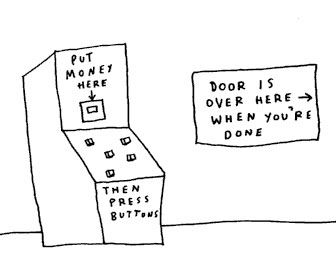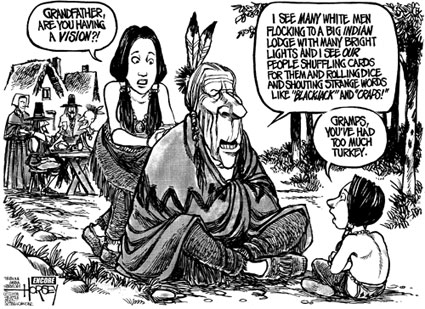
This past Sunday, October 20th, in the pages of the Arizona Republic “Valley and State” section, cub reporter Caitlin McGlade summarized arguments pro and con concerning the future of Indian Gaming on Tohono O’odham reservation land — property surrounded by Glendale, Arizona and adjacent to the Westgate sports district at 95th Ave and Northern.
For those of us following this saga closely, little new was offered. Significantly, Glendale city council now offers up mixed signals over construction of the proposed casino/resort. Opposition by city officials toward allowing an un-taxed business entity near the Glendale subsidized hockey arena, seems to be weakenig. The continuous fiscal drain of an expensive legal campaign waged across multiple years is reason enough for dissension among council members. Many residents have long favored the $600 million casino/resort project with its demand for thousands of temporary construction jobs and its promise of numerous long term service employment wages for the citizens of the West Valley.
Meanwhile, Glendale Sports Complex remains an economic asterisk due to its glamorous appeal minus substantial return on investment. A steady draw of tax dollars toward the city funded arena and subsidized National Hockey League team, has fueled cutbacks to city safety personnel and necessitated diminished city services; notably curtailment of library hours. While the Indian run casino/resort would not provide direct tax dollars into Glendale coffers, neither would the city bare any construction costs. Some would argue that a multi-million dollar resort facility would draw visitors to Glendale, who might not otherwise venture into the West Valley. Such guests might also spend money at neighboring Westgate shops and entertainment venues.
Before Jerry Weirs was elected Glendale Mayor in 2012, former Mayor Elaine Scruggs accused Weir’s of working against Arizona cities, in his role as an Arizona Legislator from District 12. Mayor Weirs recently co-signed an AZ Republic op-ed, along with several other Maricopa county mayors, opposed to the West Valley casino, taking cover behind “Keeping the Promise“, a anti-gambling coalition expressing an overtly religious viewpoint. KtP believes the Tohono O’odham implicitly agreed not to pursue building a Maricopa County based casino.
These misguided assumptions derive from Arizona gaming compact requirements limiting Indian run casinos to locations on land with reservation standing. What KtP fails to grasp, the Tohono O’odham property in the West Valley has been awarded reservation status, as replacement land. This fact destroys the KtP narrative, so they simply choose to ignore it.
All court judgments to date have ruled in favor of the Southern Arizona tribe, finding no basis for consideration of specious arguments like those held by KtP. This has not deterred KtP zealots from seeking new advocates for their discredited agenda, such as Mayor Weirs.
McGlade produced one golden nugget, when she states:
“The arguments for and against the casino in Glendale have mainly hinged on whether its presence would help or hurt nearby shops and restaurants at Westgate.”
So we ask:
- When will an end to the battle against this casino allow city officials to focus on the upcoming Super Bowl, as sharply requested recently by NFL league officials?
- When will Glendale staunch the legal bleeding of taxpayer dollars and cease fighting a losing cause against the Tohono O’odham?
- Whwn will a $600 Million construction project paid for by the TO tribe bring jobs to Glendale and the West Valley?
That folks is the crux of the matter. When will Glendale end their narrow focus on a pet project, the Sports Complex at Westgate, which has stubbornly refused to yield net revenue for the city? While spawning ruin for those financially vested in its success, the citizens of Glendale have paid greater sales tax than any surrounding West Valley community and have been saddled with shrinking numbers of safety personnel and shorter library hours.
Glendale residents are owed greater consideration by their elected officials, and a solution to the flow of taxpayer dollars into the money pit which is the Westgate Sports Complex. Enough already.
Tags: big business, conservative anxiety, fear mongering, greed, religious beliefs

A good friend pointed me to a New York Times opinion piece for Monday, August 26, 2013 by noted economist Paul Krugman entitled: The Decline of E-Empires. The catalyst for the article was the forthcoming resignation of Steve Ballmer, CEO of Microsoft. The scope of the article remarked on the long running rivalry between Bill Gates (Microsoft) and Steve Jobs (Apple). Though neither icon holds the helm of either company today, Paul Krugman presents a lesson in how rigid monopolies eventually lose the ability to adapt to changing technologies.
I have always liked reading Mr. Krugman. My take this time; Paul oversimplifies the dynamics of technology. Yes, from a dollars and cents aggregate (how economists view things), today Microsoft is down and Apple is up, which is opposite how the war played out in the late twentieth century.
Barbarians at the gate aside, I see “Microsoft vs Apple” as more of a question of purpose. Microsoft functions better as a boring yet highly efficient work tool. While Apple has mutated from an artsy-fartsy graphic-design machine, into the technical choice for personal-time activities — music, movies and games. It seems less a black or white choice between companies, than a reflection on how and where Americans spend their disposable income. With lots of time and money, the US has become the opulent purveyor of leisurely pursuit and Apple chose to be king of this domain, while Microsoft maintained the lions-share of the personal computer business.
BTW: the transformation of Apple from geeky to sexy, started with the iPod (a music player), which improved upon the Sony Walkman (itself a game-changer) and earned Apple bushels of $$. The technical zinger capitalized upon by Apple was touch screen display. The consumer market ate up touchy-feely. It introduced a simplified user interface, much as mouse-based desktop PCs revolutionized in its day, previously controlled menu-driven keyboard clicks. One big problem: touch screen seems less handy creating detailed documentation for print-based work – a necessity in the business world.
Apple’s dominance will continue only with additional innovation. Apple iPods, iPhones and iPads all sell well because of a masterful touch screen interface. Android devices – also employ touch screen control, with open source design and naturally occurring, continuous minor innovation, and these Google-inspired devices have largely overtaken Apple in the hand-held field at a reduced price point.
Agreeing with Paul Krugman about the rigidity of monopolies; the surge by Android (and possibly Windows Phone), is largely due to Apple insisting on controlling the entirety of the production cycle (hardware, software and service) — a business plan which is a repeat of the PC vs McIntosh wars, which Apple famously lost, in my opinion. Apple demands top dollar for their innovations, but this past year has not been that sort of year. Apple’s stock price is down 45% from a year ago, when they were the largest capitalized company in the world.
There is an upsurge in other touch screen devices, and it would be foolish to assume that the current US leader in leisure time products will necessarily rule business grade products. That is not the case presently, nor does it look to be the case going forward.
Please note, the demise of Ballmer is not the passing of Microsoft. Ballmer is out because he failed to properly address the consumer branch of the company with enough flair and sufficient profit. Business is still good at big blue and could be coming back with the introduction of Windows 8, a touch-aware operating system. Still, it is too little, too late for Steve Ballmer.
Tags: big business, public opinion, Technology

Glendale, Arizona faces a hard reality. Can the town afford to host a National Hockey League (NHL) franchise team, the Phoenix Coyotes? Bad enough that Glendale publicly financed a dedicated structure for a professional hockey team, and that team chose to remain branded to its bigger neighbor, but now Glendale has chosen to additionally burden its citizens with arena management fees, formerly funded by team owners.
When former Coyotes owner Jerry Moyes tossed in the towel three years ago, the NHL assumed ownership under league rules, which prohibited private business interests from acquiring and moving the team to Canada. The NHL desired a continued presence in the sixth largest market in the U.S, the Phoenix metropolitan area. Glendale looking to protect its sports brand, also called foul any team relocation efforts, but incurred stiff penalties for interim administration of team operations by the league, fees amounting to $25 Million per year.
Independent management cost estimates were sought by Glendale officials as an aid to negotiations with future team owners. Since before 2009, operating expenses were a team responsibility, so post-bankruptcy, arena operating costs were a mystery to Glendale officials. Perhaps city officials were distracted by their ongoing legal battle with the Tohono O’Odham tribe over ownership of unincorporated Glendale land, less than a mile from Glendale’s sports district. This property was taken into reservation by the tribe, with the intention of building a casino/resort. Why Glendale failed to protect real estate within eyesight of both the arena and the football stadium suggests a reoccurring theme, a lack of proper city planning.
Last year when a price of $14-15 Million was given by an arena-consulting firm as a reasonable estimate to operating Glendale’s hockey facility without any specific tenant; city officials could not refute the numbers. With only these figures, Glendale bargained with perspective buyers of the team, agreeing to pay new owners $16 Million per year over the next 20 years, in pursuit of a promise to keep the team in Glendale. This negotiated offer was less than the ransom now being paid to the NHL under league ownership. Yet even this sweet-heart deal fell through this year, suggesting team profitability in even a worse state than previously imagined.
In a council meeting last year just a few weeks after the above cost estimate was made public, actual management figures of about $6 Million per year, were revealed by Glendale City Attorney Craig Tindall, as he maneuvered to counter alleged city misuse of public funds by the Goldwater Institute. April of this year, Glendale put out to bid solicitations, seeking private management of the arena, and actual management expenditures incurred by the NHL holding company currently managing the facility since 2009 were offered as hard fact.
So where is the justification for Glendale paying $25 million/year, the past two years to the NHL, when real operating costs were only $5.1 – 5.5 million, according to league figures? Either the NHL is gouging Glendale, or the Coyotes are indeed a net-loss franchise in the desert southwest. The truth is probably something of a mix. That the new mayor and city council members wish to plead ignorant to these findings when detailed costs are available in public documents out-to-bid, accentuates the real negligence in the bleeding of taxpayer monies.
Kudos to Paul Giblin’s recent article in the AZ Republic providing much background material.
Tags: big business, Corporate welfare

First article in the AZ Republic which weighs the evidence and favors the arguments for a casino in Glendale. Perhaps the worm has turned.
Giblin & McGlade clearly present the crux of the matter: does the current AZ Gaming compact implicitly limit the number of casinos in the Phoenix metro area? This is the last remaining argument worthy of judicial interpretation, and the presiding judge seems to find this line of reasoning specious.
Washington attorney Jason Hauter, a member of the Gila River tribe who has been involved in the case, said the proposition and the compact clearly limit the number of tribal casinos.
However, the Tohono O’odhams state in court filings that the compact lacks specific language that prohibits the tribe from building a Phoenix-area casino.
During a June 2011 hearing, Campbell (the presiding judge) alluded to that point, asking Gila River attorney James Tuite whether it would have been easy to include in the contract that no new casinos would be built in Phoenix.Tuite said that it would have been but that there were good reasons to think that the parties didn’t feel the need to spell it out.
Campbell responded: (emphasis mine)
Well, that’s a pretty surprising idea, in my mind, for parties who are represented by lawyers and who are negotiating a contract that will become a compact that has an integration clause that says, No other understandings or agreements not in writing will be enforceable. For somebody with that kind of a clause going into the compact, saying this other understanding is so fundamental that we don’t have to say it just didn’t make any sense to me.
If this next court ruling goes for the tribe one more time, perhaps the new city leaders of Glendale under Mayor Weirs will take the practical road and end their opposition to this west side resort. We shall see. Last week Gila River Reservation offered Glendale a $0.5 million bribe to continue the good fight. Will Glendale get cold feet? Only time will tell.
Tags: big business, greed, Indian Gaming, lobbyist influence, obstruction, public opinion
